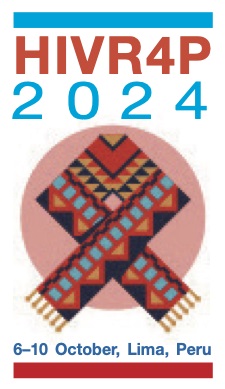Impact on CD4 counts of once-monthly islatravir in PrEP studies: early macaque results with MK-8527 follow-on compound
9 October 2024. Related: Conference reports, Antiretrovirals, HIV prevention and transmission, R4P 2024 Lima.
Simon Collins, HIV i-Base
 Two oral abstracts at R4P 2024 included safety results from phase 3 PrEP studies of once-monthly oral islatravir (ISL) which were stopped early due to the potential adverse effect of reducing CD4 lymphocytes. [1, 2]
Two oral abstracts at R4P 2024 included safety results from phase 3 PrEP studies of once-monthly oral islatravir (ISL) which were stopped early due to the potential adverse effect of reducing CD4 lymphocytes. [1, 2]
A poster at the conference included efficacy data on MK-8527, a similar compound with the potential for once-weekly oral PrEP. [3]
Both phase 3 PrEP studies were randomised placebo-controlled studies comparing once-monthly oral islatravir (60 mg QM) to daily oral TDF/FTC. Both were stopped after less than one year with all participants offered open-label oral TDF/FTC for continued safety follow-up.
No participants in either study became HIV positive during the randomised phase although incident infections were reported during the later follow-up phase.
The results of the IMPOWER-22 study in cisgender women were presented by Sinead Delany-Moretlwe from the University of the Witwatersrand, Johannesburg. [1]
Of the 727 cisgender women initially randomised (1:1) and treated, 95% continued in the open label study. Most participants were Black or African American (92.4%) and median age was 25 (range 18 to 46) years.
During the blinded phase adverse events were reported by 55% vs 70% in the ISL vs TDF/FTC control groups respectively, but with <2% rated grade 3 or 4.
Headache was most common with ISL (11.6%), with bacterial vaginosis (15.3%), headache (14.5%) and nausea (11.2%) reported in the FTC/TDF group. Other infections were reported in 22.4% vs 40.5% respectively.
The mean total lymphocyte percentage drop at month 3 was –20.8% (95%CI: –24.0 to –17.6 vs –8.9% (–11.6 to –6.2; n=280) respectively. After one year on open-label TDF/FTC the study only reported a trend to recovery with reductions compared to baseline of –6.3% (–8.7 to –3.9) vs –5.3% (–8.0 to –2.7), respectively.
Similar results from the IMPOWER-24 study in 494 gay men and transgender women (4.5%) (randomised 2:1) were presented by Raphael Landowitz from UCLA, Los Angeles. [2]
Demographics included 42% white, 25% Black/African American, 20% Asian and median age was 27 (range 18 to 76) years.
Adverse events were reported by 64% vs 77% of the ISL vs control group respectively and were mild or moderate in 96% cases. Infection AEs were reported in 37% vs 50.0% with COVID-19 being the most common (11% vs 13%, respectively).
At month 3, mean percent change in total lymphocyte count was –7.4% (95%CI: –10.6 to –4.1) vs –2.7% (–6.9 to +1.4). At month 9 this was –17.4% (–23.4 to –11.4) vs 0.4% (–6.1 to +6.9).
Although islatravir is no longer being developed as PrEP, a second NRTTI from MSD called MK-8527 is now being studied, with early results from a once-weekly macaque study presented as a poster. [3]
This study included 24 animals in two active arms using different doses and one placebo arm (n=8 in each), including washout periods between dose reductions (6.0>1.0>0 mg/kg in group 1 and 2.0>0.3>0.1 mg/k in group 2) with 10 rectal challenges.
comment
These data confirm the safety concerns and support the importance of reducing the dose in treatment studies.
The early data on MK-8527 are also very promising.
References
- Delany-Moretlwe S et al for the IMPOWER-22 Study Group. Safety and tolerability of oral islatravir (ISL) once-monthly (QM) as pre-exposure prophylaxis (PrEP) in cisgender women at elevated risk for acquiring HIV-1. 5th R4P 2024, 6–10 October 2024. Oral abstract 0201.
https://programme2024.hivr4p.org/Abstract/Abstract/?abstractid=248 - Landovitz RJ et al. Safety and tolerability of oral islatravir (ISL) once-monthly (QM) as pre-exposure prophylaxis (PrEP) in cisgender men and transgender women at elevated risk for acquiring HIV-1. 5th R4P 2024, 6–10 October 2024. Oral abstract 02.
https://programme2024.hivr4p.org/Abstract/Abstract/?abstractid=250 - Diamond TL et al. Weekly oral phrophylaxis with MK-8527 protects rhesus macaques from rectal challenge with SIV. 5th R4P 2024, 6–10 October 2024. Poster TUPE020.
https://bit.ly/3AMI7Qm (poster)
https://hivr4p2024.iasociety.org/cmVirtualPortal/_iasociety/hivr4p2024/eposters#/PosterDetail/2207 (ePoster)

